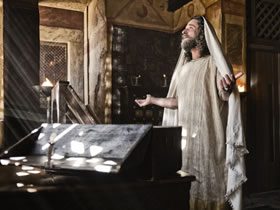Episode 4: Mission
From the miracles of Jesus, through the reaction of the authorities and Jesus' arrival in Jerusalem to his sentence of death, we might think about the big themes of betrayal and trust.
As with all literature the Bible presents a perspective that contrasts with other worldviews.
What motivates the religious authorities as they respond to Jesus? How do his teachings and actions challenge their worldview?
Jesus welcomes everyone, and calls for a transformation in our hearts through forgiveness and faith. Many of the religious elites see this radical agenda as a challenge to their powerbase and lifestyles.
- The religious authorities are rigid in their adherence to the Law of Moses and believe that it is only possible to please God by being morally and ritually pure.
- They are outraged by Jesus because he mixes with those who are very impure, including tax collectors who exploit people and collaborate with the Roman oppressors:
-
- 'While Jesus was having dinner at Levi's house, many tax collectors and sinners were eating with him and his disciples, for there were many who followed him. When the teachers of the law who were Pharisees saw him eating with the sinners and tax collectors, they asked his disciples: "Why does he eat with tax collectors and sinners?" On hearing this, Jesus said to them, "It is not the healthy who need a doctor, but the sick. I have not come to call the righteous, but sinners."' (Mark 2:15–17)
- Jesus consistently argues that what God is looking for is repentance and faith, not rule-keeping which leads to pride rather than dependence on God. He quotes the prophet Hosea to the teachers of the law:
-
- For I desire mercy, not sacrifice, and acknowledgment of God rather than burnt offerings. (Hosea 6:6)
Why do the political authorities believe that Jesus is a threat? From their perspective, why is it necessary to keep him quiet?
Jesus offers hospitality and forgiveness to all the 'wrong kinds of people' and talks about a new kingdom that begins with a transformation in our hearts. This is seen as a threat to the traditional and judgmental religious leaders.
- Right from the start of his ministry, Jesus talks about the 'kingdom of God', which is inevitably seen as a challenge to the establishment:
-
- 'After John was put in prison, Jesus went into Galilee, proclaiming the good news of God. "The time has come," he said. "The kingdom of God has come near. Repent and believe the good news!"' (Mark 1:14–15)
- Many people in Judea become increasingly excited about Jesus and the possibility that he may be the Messiah.
- As the people flock to Jesus, his immense popularity and the way he is viewed by them constitute a threat to the existing power structures.
- Jesus is also a threat because he is in the tradition of the Old Testament prophets, who challenged the political authorities of their day;
-
- 'Then the word of the Lord came to Jeremiah the prophet: "This is what the Lord, the God of Israel, says: Tell the king of Judah, who sent you to inquire of me, 'Pharaoh's army, which has marched out to support you, will go back to its own land, to Egypt. Then the Babylonians will return and attack this city; they will capture it and burn it down.' . . . They were angry with Jeremiah and had him beaten and imprisoned in the house of Jonathan the secretary, which they had made into a prison. Jeremiah was put into a vaulted cell in a dungeon, where he remained a long time.' (Jeremiah 6–16)
What leads ordinary people to trust Jesus?
The ordinary people respond to Jesus' offer. Unlike the ruling elite, they don't hold on to the pride and self-righteousness that stops people from receiving God's gift of forgiveness and transformation.
- Jesus made an enormous impact on ordinary people because he taught with authority (see Mark 1:22), he performed miracles, and he had deep compassion for even the most despised people:
-
- 'Jesus went through all the towns and villages, teaching in their synagogues, proclaiming the good news of the kingdom and healing every disease and sickness. When he saw the crowds, he had compassion on them, because they were harassed and helpless, like sheep without a shepherd.' (Matthew 5:35–36)
- Right at the start of his public ministry, Jesus quoted from the prophet Isaiah to explain what kind of ministry it would be:
-
- 'The Spirit of the Sovereign Lord is on me, because the Lord has anointed me to proclaim good news to the poor. He has sent me to bind up the broken-hearted, to proclaim freedom for the captives and release from darkness for the prisoners, to proclaim the year of the Lord's favour.' (Isaiah 61:1–2)
What expectations do Jesus' closest friends have as they trust and follow him? In what ways does he meet these expectations, and in what ways does he have a contrasting agenda?
Even Jesus' closest followers do not yet fully understand his mission. It will be some while before they see that, in order to offer forgiveness and new life, Jesus must give himself to death on the cross – to pay the price of our sin.
- Even Jesus' closest followers did not really understand the nature of Jesus's mission. When Jesus predicts his death, Peter rebukes him, but is in turn rebuked for misunderstanding it so badly:
-
- 'He then began to teach them that the Son of Man must suffer many things and be rejected by the elders, the chief priests and the teachers of the law, and that he must be killed and after three days rise again. He spoke plainly about this, and Peter took him aside and began to rebuke him. But when Jesus turned and looked at his disciples, he rebuked Peter. "Get behind me, Satan!" he said. "You do not have in mind the concerns of God, but merely human concerns."'(Mark 8:31–33)
- After Jesus's death, the disciples are emotionally shattered because they believe that all their hopes for Jesus have been unfounded (see Luke 24:21).
- The Bible is always clear that human understanding is always inadequate for understanding God and his ways (see Job 38 – 41, for example). In Isaiah, God says:
-
- 'I am the Lord, the Maker of all things, who stretches out the heavens, who spreads out the earth by myself, who foils the signs of false prophets and makes fools of diviners, who overthrows the learning of the wise and turns it into nonsense.' (Isaiah 44:24–25)
How do the agendas of various players in the story (such as Judas, the religious authorities and the Roman authorities) come together to seal Jesus' fate? How does Jesus view what happens?
Whatever the different agendas of those involved, the overall agenda is set by God, who has come in the person of Jesus to die so that all may be offered forgiveness and new life. That is why Jesus willingly goes to the cross.
- The various human agents at work in the story are all acting out of self-interest, with the exception of Jesus himself: Judas seems to act out of greed, the religious authorities act out of hatred for Jesus challenging their authority, and the Roman authorities act out of fear of instability.
- Jesus sees it all from a very different perspective: this is all part of God's rescue plan, and he is ultimately in control, working through these self-interested choices to bring about what he has planned:
-
- 'Pilate said. "Don't you realize I have power either to free you or to crucify you?" Jesus answered, "You would have no power over me if it were not given to you from above. Therefore the one who handed me over to you is guilty of a greater sin."' (John 19:10–11)
- Jesus also understood that he had come to earth in order to die (see Luke 24, as Isaiah had prophesied:
-
- 'He was oppressed and afflicted, yet he did not open his mouth; he was led like a lamb to the slaughter, and as a sheep before its shearers is silent, so he did not open his mouth. By oppression and judgment he was taken away. Yet who of his generation protested? For he was cut off from the land of the living; for the transgression of my people he was punished. He was assigned a grave with the wicked, and with the rich in his death, though he had done no violence, nor was any deceit in his mouth.' (Isaiah 53:7–9)






